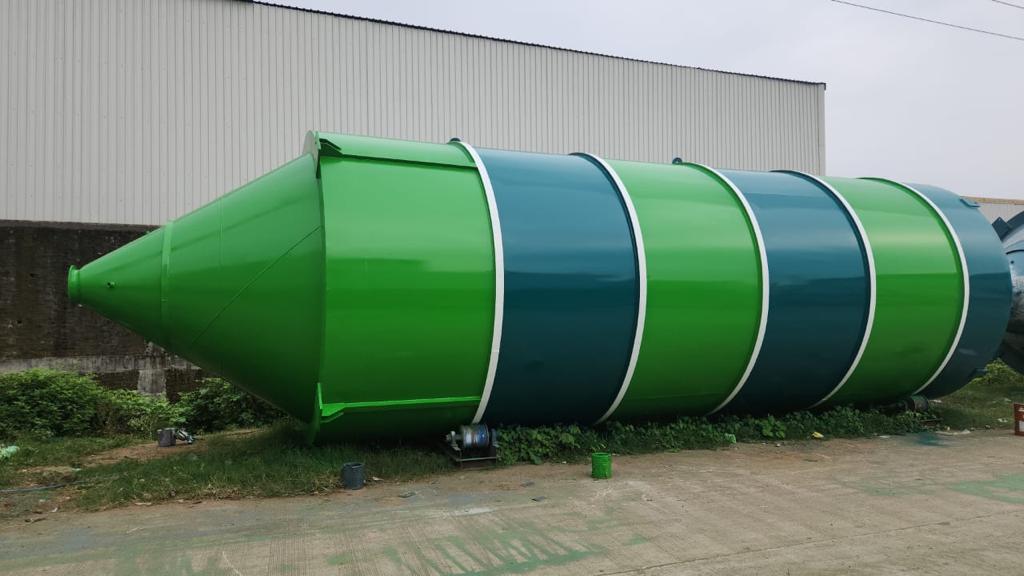Get In Touch
Get In Touch




Description:
Structure: Silos are typically tall, cylindrical or conical towers made from materials like steel, concrete, or sometimes wood. The shape may vary depending on the stored material, with conical silos being suitable for free-flowing materials like grain. Capacity: Silo capacities can range from a few tons to thousands of tons, depending on their purpose and size. Large industrial silos can store immense quantities of materials. Aeration Systems: Many silos incorporate aeration systems to maintain the quality of the stored materials by controlling temperature and moisture levels.
1. Material Construction: Typically constructed from high-quality steel or concrete to ensure structural integrity and durability.
2. Capacity: Available in a wide range of storage capacities, from small to very large, depending on the material and application.
3. Shape: Storage silos can come in various shapes, including cylindrical, conical, or rectangular, based on the stored material and requirements.
4. Roof and Flooring: The design may include various types of roofs and flooring materials, such as conical, domed, or flat roofs, and concrete, steel, or epoxy-coated flooring.
5. Access Points: Equipped with access doors, hatches, and manholes for easy entry and inspection.
6. Ventilation: Provides ventilation and aeration systems to control temperature, humidity, and air quality within the silo.
7. Ladders and Platforms: Includes safety ladders, catwalks, and platforms for safe access to the top and inspection of the silo.
8. Safety Features: May incorporate handrails, guardrails, and fall protection systems to ensure worker safety during maintenance and inspections.
9. Foundation: Typically requires a stable and level foundation, such as a concrete pad or piers, to ensure the silo's stability and structural integrity.
10. Weatherproofing: Utilizes seals and gaskets to maintain an airtight and weatherproof environment inside the silo, protecting the stored materials.
11. Compliance: Designed and constructed in adherence to relevant industry standards and regulations, particularly those related to structural integrity and safety.
12. Expansion Options: Some storage silos are designed with expansion capabilities, allowing for easy addition of more storage capacity when needed.
13. Maintenance: Regular maintenance is essential to check for wear, corrosion, and to ensure the structural integrity of the silo.
1. Agriculture: Silos are used to store grains, seeds, and animal feed, ensuring efficient and organized management of agricultural produce.
2. Food Processing: In the food industry, they store ingredients like flour, sugar, salt, and powdered additives, helping maintain production consistency.
3. Chemical Manufacturing: Silos store chemicals, powders, and raw materials for controlled production processes, ensuring safety and quality.
4. Mining and Minerals: These silos are employed for the storage of minerals, ores, and aggregates, aiding in efficient material handling and stockpile management.
5. Cement and Construction: Silos store cement, aggregates, and other construction materials, maintaining consistent quality in construction projects.
6. Energy Generation: In power plants, silos are used for the storage of materials like coal, biomass, and ash for efficient energy generation.
7. Waste Management: Silos store and manage materials in waste management facilities, such as recyclables, compost, and hazardous waste.
8. Water Treatment: They store chemicals and materials required for water treatment processes, ensuring a steady supply for purification and filtration.
9. Industrial Manufacturing: Various industries employ silos to store materials used in manufacturing processes, such as automotive, aerospace, and electronics manufacturing.
10. Mining and Quarrying: Silos are used to store mined materials like limestone, sand, and gravel in mining and quarrying operations.
11. Plastics and Petrochemicals: These silos are used to store plastic granules and raw materials, ensuring efficient production in the plastics industry.
12. Environmental Monitoring: They are used in environmental monitoring stations to store collected samples, such as air particulates or water pollutants.
13. Wood Processing: Silos store wood chips, sawdust, and other wood-related materials in the wood processing and pulp and paper industries.
14. Bulk Material Handling: Industries dealing with bulk materials, such as coal, sand, or aggregates, use silos for efficient and weather-resistant storage.
15. Chemical Storage: They store chemicals for various industrial processes, including the storage of raw materials, intermediates, and final products.


